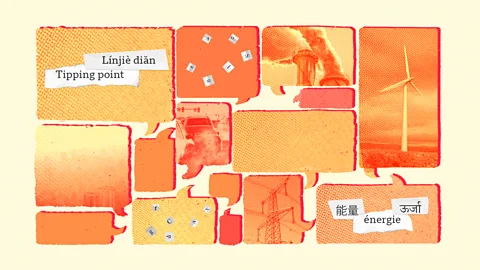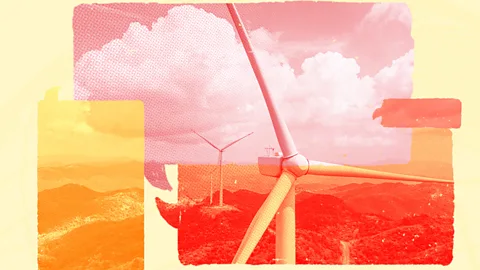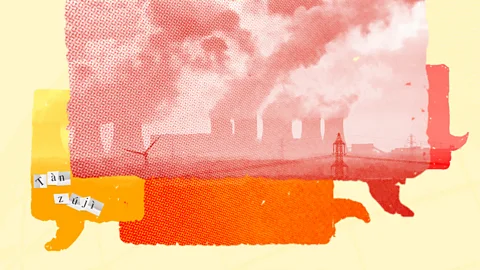The people cracking the world's toughest climate words
 Serenity Strull/ Getty Images
Serenity Strull/ Getty ImagesWhen it comes to solving climate change, every word counts. From the pitfalls of metaphors to the multiple meanings of the word "energy" – this is how translators at global climate negotiations navigate the language of global warming.
"I remember one morning we returned to our hotel at around 4:00am and slept for two hours. Then we were told that the final document was adopted so we had to rush back to the conference to translate the outcome documents," says Jianjun Chen, a Chinese language translator at the United Nations, based in Geneva.
He is recounting the frantic hours before negotiators reached a deal at the 24th Convention of Parties to the United Nations Framework Convention on Climate Change (UNFCCC) – or COP24 – in Katowice, Poland, in 2018. Chen, who has worked at the UN for 14 years and translated multiple documents from the UN climate talks into Mandarin, isn't fazed by the long hours or lack of sleep.
This year's UN climate talks in Baku, Azerbaijan, will be his 13th. As world leaders gather for COP29 in Baku, Chen and 25 other translators are preparing for a slew of new climate vocabulary to enter the discourse – words that will dictate the ways countries and campaigners approach climate action.
Chen also translated important documents when the landmark Paris Agreement was signed at the UN climate talks in 2015 (COP21), pledging to try to prevent global warming to well below 2C, with a stretch target of a 1.5C limit. (Read more about why 1.5C is a critical threshold in this story by Martha Henriques). "I was called to start working in the middle of the night at 2 or 3am. Since there was always a tight deadline, we didn't have the luxury to fall asleep," he recalls.
"The final text is the result of negotiations, sometimes very intense negotiations. So you have to be very careful about the wording. It probably just looks very ordinary, but the member states spent days and nights to reach an agreement on this final wording."
What's in a name?
In the English-speaking world, most people have a firm grasp on what "energy" means in the context of climate change. Among languages with similar linguistic roots to English, the word is easily adjusted:
• Spanish: energía
• French: énergie
• German: Energie
But translating the word to other languages takes a little more work:
• Hindi: ऊर्जा (oorja) refers to energy when used in the context of energy production, climate change, and such. There is a different Hindi word for spiritual, divine energy: शक्ति (shakti). And yet more words such as ताक़त (taaqat – which is adopted from Urdu) or बल (bal) referring to physical force.
• Mandarin: 能量 (néngliàng) is a scientific term referring to quantifiable physical energy whereas 能源 (néngyuán) refers generally to energy sources like solar or wind.
The work is strenuous for negotiators and translators alike. "I've heard some of the delegates actually sleep in the conference room," Chen says.
Translating page after page of climate policy under immense time pressure is not an easy task. "A lot of these reports that we translate on climate change are written by scientists," says Chen. They contain complex technical terms such as "carbon neutrality" and "loss and damage", which require knowledge of the basic meanings of the individual terms, as well as the environmental context.
"The challenge for us as translators when it comes to these types of documents is that we need a lot of technical expertise," says Chen.
Word choices
At COP28 in Dubai in the United Arab Emirates (UAE) last year, negotiations almost collapsed as almost 200 countries argued over how to include fossil fuels in a UN climate pledge for the first time.
The phrase "transitioning away from fossil fuels in energy systems" appears in the UAE Consensus, the final agreement which Chen and his colleagues translated. The 21-page document took aim at fossil fuels and their role in exacerbating climate change. The UAE Consensus signaled a landmark commitment toward reducing the world's reliance on coal, oil and gas, though to what degree and how quickly remained unclear. Politicians at the conference praised the "historic achievement", but many climate activists and scientists criticised the language for being too weak.
For translators like Chen, the goal is to keep translations as close to the connotation and intent of the original language, regardless of the climate politics. But translating the text still poses some serious challenges. "In Chinese, the phrase 'transitioning away from something' is difficult to describe without specifying what the object transitions toward," Chen says.
 Serenity Strull/ Getty Images
Serenity Strull/ Getty ImagesChinese media outlets had translated the phrase into Chinese in several ways: "getting rid of fossil fuels", "eliminating", or "abandoning", says Chen, which he and his colleagues decided felt "too strong".
"After several rounds of discussions with my colleagues, I settled on something along the lines of 'realising a transition in energy systems by gradually distancing ourselves from fossil fuels' [in Mandarin] which I believe was closer to the original tone," Chen says.
In other places in the world, translators may have to be more creative, especially when a word or phrase has no direct equivalent in the target language – sometimes termed "untranslatable" words or phrases. (Read more about how certain "untranslatable" terms affect our emotions.)
A "just transition" is term that refers to how countries can shift to a greener economy in a fair and inclusive way for everyone. Even in English it can have a second meaning – without context it could simply be a request to get on with things. But in other languages it can be even more complex.
Sabir Ahamed, a researcher at the Pratichi Institute in Delhi, India, worked with a linguist to translate "just transition" into Bengali for a study on local mine closures in West Bengal, India. As of 2023, India is the world's second-largest coal producer and millions work in the coal mining sector. The Pratichi Institute's effort is part of a wider move by some English-speaking think tanks in India to make jargon-heavy climate change dialogue more accessible to Bengali-speaking communities.
The concept of the phrase is complex and has no direct equivalent in Bengali, says Ahamed. He settled on the phrase kalo theke aalo, which together means "from darkness to hope". The phrase, while not an exact translation, contains the word kalo, which in West Bengal communities is already associated with coal, and thus captures a shared cultural understanding of the meaning, Ahamed says.
"It is easy to understand as the equivalent English is too complex and very technical – not for the lay person," he says. Since then, Ahamed says some members of the community have reached out to him regarding further research.
Conveying this information successfully is "vital" for tribal and minority communities in India who do not understand Hindi, says Ahamed. India's most recent commitment to net-zero emissions could affect thousands of jobs being phased out in the country's coal industry in the next two decades, according to a report from the nonprofit the National Foundation for India.
Lost in translation
Another language issue that comes up at climate talks is the problem of figures of speech, or what is called framing, says Arran Stibbe, a professor in ecological linguistics at the University of Gloucestershire in the UK. Stibbe is also founder of the International Ecolinguistics Association, a network of researchers who examine the role of language in the environment and the lives of humans.
There are different kinds of framing that affect the way people contextualise broad issues like climate change. For example, framing climate change as a global security threat creates a sense of immediacy and pressure to act, Stibbe says.
In the context of climate change, metaphoric framing can sometimes be misleading, says Stibbe. For example, climate change is sometimes likened to a time bomb, which he says is problematic because when a bomb goes off, the destruction is immutable and final, but climate change is a gradual change. Using this framing could suggest that climate action is a waste of time. "The [term] time bomb could make people give up. It's like, 'well, we're not going to be able to diffuse it, so it's going to happen, let's party,'" says Stibbe. "[But climate change] is not an all-or-nothing kind of situation."
Then there are dead metaphors. These are figures of speech that have lost the power of their original meaning through repeated popular usage, and they are a particular challenge for translation across cultures, says Stibbe. For most English speakers, killing time doesn't elicit the image of stabbing time with a knife – it simply means to let time expire. However, this kind of metaphor can undergo a change in what Stibbe calls "activation levels" when translated directly. What is "really a normal expression in one language can sound like a really strong metaphor in another language".
He has also heard climate change being described as "a rollercoaster which we may not survive". He chuckles at this comparison because rollercoasters are "typically not deadly".
"The other problem with the roller coaster one is that [it implies] we're going up and we're going down, but we don't actually have any control," says Stibbe, whereas the choices that governments and societies make can still sway the progression or de-escalation of the climate crisis.
Effective climate change discourse involves "being aware of the kind of frames that are being used, being aware of the problems that these frames have and being aware of a whole set of alternative ways of framing climate change", Stibbe says.
 Serenity Strull/ Getty Images
Serenity Strull/ Getty ImagesWhen Chen encounters metaphors, he tries to maintain them in the translation. In most cases, he will be able to translate metaphors literally, like "carbon footprint" (碳足迹, tàn zújì), but "if for some reason we cannot recreate the metaphors in Chinese, we will try to convey the meaning instead of the form". For example, the phrase "tipping point" is translated into Chinese as "critical point" (临界点, línjiè diǎn). But Chen says metaphors are fortunately not common occurrences in UN documents.
Beyond the crucial work in overcoming language barriers, there are other benefits to working closely with a translator, says David King, the UK's former climate envoy who led the country's negotiations during the Paris Agreement. Communication via a translator tends to be more thought-through, King explains.
"Yes, it takes a bit of getting used to," he says. "But to be honest, I love it, because it means that I speak sentence by sentence. And then, in the gap when it's being translated, I'm thinking of the next sentence. So instead of just rattling things off, I think your presentation is much clearer because of the need to provide that time for translation."
Climate justice
One of the biggest discussions at the UN climate talks every year is who is responsible for climate change and where the burden should lie in taking action to combat it and protect those most affected by mounting climate threats. This is considered an integral part of achieving climate justice.
Loss and damage, which focuses on whether wealthier countries should pay developing countries for the climate change damage they have caused, is a particularly thorny subject. Following decades of opposition from wealthy nations, a loss and damage fund was announced at COP27 in 2022. How much countries should pay into this fund will be discussed in Baku in November 2024 as part of climate finance negotiations.
Translators must carefully navigate the political waters at UN climate talks. Since there are major financial implications if countries are held liable for the climate harm they have caused, "we need to be cautious and strive to understand where the political sensitivities are", says Chen. (Find out more about what the world would look like if polluters footed the climate bill in this story by Isabelle Gerretsen).
Climate justice also involves including indigenous groups and poor countries, who tend to have been disproportionately impacted by climate change, in negotiations.
International organisations like the UNFCCC, the UN organisation responsible for the annual climate talks, have made efforts to include and recognise indigenous peoples and their knowledge systems. Yet, spaces for climate discourse can still harbour remnants of what Stibbe highlights as epistemic colonialism, where Western worldviews and ways of thinking are imposed on indigenous cultures. This can manifest in green colonialism, where discussions on environmental policies can outright disregard the rights of indigenous peoples. Framing issues with minority populations in mind can be beneficial in creating a more holistic climate discourse.
Indigenous and minority communities have important insights into the positive and negative impacts of climate change solutions, says Lisa Hayward, community engagement manager at the University of Washington Department of Environmental and Occupational Health Sciences. But in order to make those assessments, they often need information from academic and government sources to inform their decisions, which must be translated correctly, she adds.
And in some cases, this a lack of adequate translations can lead to miscommunication and confusion when relaying critical climate information, which in turn cause harm to members of linguistic minority communities.
Asian, Arabic and Somali residents in Houston, Texas, missed out on outreach and resources following Hurricane Beryl in July 2024, according to local media reports, with some of them unaware that a storm of that magnitude was even heading to their area. A little under a quarter of Houston residents have limited English proficiency.
Such practices are not in line with climate justice, says Hayward. "Climate justice demands effective communication."
As Chen prepares to translate for COP29, his mission remains the same as when he started translating at UN climate talks in 2012.
"Translation becomes our universal language, bridging understanding and fostering collaboration, ensuring that every voice resonates in this vital dialogue," he says.
* An earlier version of this article incorrectly stated that Hindi was a non-Indo-European language and was corrected on 13 November 2024.
--
For essential climate news and hopeful developments to your inbox, sign up to the Future Earth newsletter, while The Essential List delivers a handpicked selection of features and insights twice a week.
